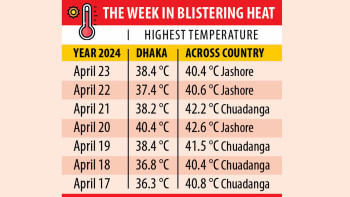Road Surface Melting: Bargain bitumen failing to bear extreme heat
As the country is baking in heatwave, road surfaces in several districts have melted due to what experts say is the use of bitumen that cannot withstand this extreme heat.
In many cases, sub-standard materials and poor construction work are leading to the untimely damage, they say.
Unless the authorities take immediate measures based on research, the problem will become more serious, says transport expert Prof Hadiuzzaman.
A record 25 days of this month were heatwave days with the country seeing temperatures of 42C or more.
According to climate researchers, a rising trend in the frequency and duration of extreme temperature events in Bangladesh seen over the last few decades may persist in the future.
In recent days, the surface of roads and highways in several places in Jashore, Chuadanga, and Shariatpur has melted, which is a safety hazard.
In recent years, Prof Hadiuzzaman says the authorities have been using 60/70 grade bitumen which is not performance-based and begins to soften at around 60C. Three Roads and Highways Department engineers agree to this view and another put the softening point even lower.
Road surface temperature tends to be 15-20C higher than ambient temperature because the dark asphalt absorbs heat and the vehicle wheels generate even more heat.
In Hadiuzzman's opinion, continued exposure to heat reduces bitumen's resilience, and after a certain time, it starts to melt at temperatures much lower than expected.
Both Hadiuzzman and Kazi Shifun Newaz, assistant professor at the Accident Research Institute (ARI) of Buet, have doubts about the quality of bitumen used on roads.
Contacted, Roads and Highways Department's Chief Engineer Syed Moinul Hasan said thin layers of bitumen used for temporarily fixing roads were probably causing the problem.
"We are not certain whether climate change has a massive impact here. We are assessing it," he said.
LACK OF PREPARATION
According to Prof Hadiuzzaman, also a former director of ARI, the road transport authorities are not prepared to tackle the adverse impact of climate change.
"If they were prepared, they would have chosen performance-based bitumen," he says, recommending the addition of polymer in bitumen for a higher melting point.
Roads are being damaged because the authorities did not conducted the research required, he says, adding that the authorities must bear in mind that climate change may increase the temperature further.
Although performance-based bitumen is costlier than 60/70 grade bitumen, the lifetime cost of such a road is lower.
Concrete can also be chosen because of its lower maintenance cost.
The RHD has started using polymer-modified bitumen to repair Dhaka-Chattogram highway and widen Dhaka-Sylhet highway, said its Chief Engineer Moinul.
The cost of polymer-modified bitumen is around 15/20 percent higher than the 60/70 grade bitumen.
Prof Hadiuzzman points out that construction workers need proper knowledge about polymer-modified bitumen and the authorities need facilities to test it.
There are 22,476km of roads under the RHD network. Of this, 3,991km are national highways, 4,897km regional highways and 13,558km district roads, according to the RHD's 2022-23 annual report.

 For all latest news, follow The Daily Star's Google News channel.
For all latest news, follow The Daily Star's Google News channel. 











Comments